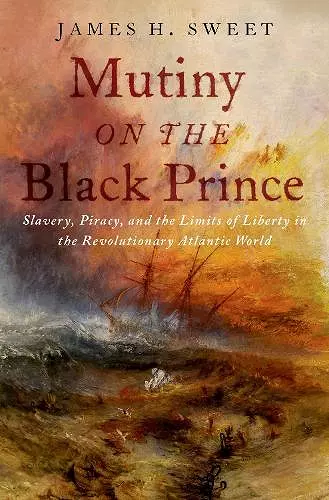Mutiny on the Black Prince
Slavery, Piracy, and the Limits of Liberty in the Revolutionary Atlantic World
Format:Hardback
Publisher:Oxford University Press Inc
Published:7th Jan '25
Should be back in stock very soon

The dramatic story of a mutiny aboard an eighteenth-century British ship and how its owners effectively rallied the power of the British Crown to protect their investment and expand their wealth and political power across multiple generations. In 1768, the British slave ship Black Prince, departed the port of Bristol, bound for West Africa. It never arrived. Before reaching Old Calabar, the crew mutinied, murdering the captain and his officers. The mutineers renamed the ship Liberty, elected new officers, and set out for Brazil. By the time the ship arrived there, the crew had disintegrated into a violent mob and fired into the port city. After the Black Prince wrecked off the coast of Hispaniola, the rebels fled to outposts around the Atlantic world. An eight-year manhunt ensued. This book follows the crew's turn to piracy and the merchant-owners' response to the uprising. At the very moment that the American Revolution unfolded in North America, the Black Prince's owners conducted a "shadow" revolution, mobilizing the power of the British Crown to seek justice and restitution on their behalf. These private merchants used state surveillance, policing, extradition, capital punishment, international diplomacy, and even warfare in order to protect their wealth. During an era of professed liberty and freedom, the privatization of state power was already emerging, replacing monarchies with corporate oligarchies, presaging a new kind of political power in the Atlantic world. The eighteenth-century Bristol slave merchants and subsequent generations of their families accrued great fortunes from the trade and invested it in early British banks, railroads, insurance companies, industrial manufacturing, and even the Anglican Church. Mutiny on the Black Prince narrates the dramatic story of the events onboard and the merchant owners' efforts to capture the rebels from around the Atlantic world, as well as the way that British slavery shaped the industrializing Atlantic economy and the evolution of the modern corporate state.
...looks unflinchingly at the greed, exploitation and violence that powered Britain's immense slave trade during the eighteenth century. This important new book is a must read for anyone who wants to understand how the slave trade operated and its importance for shaping global capitalism. * Nicholas Radburn, LitHub *
Reconstructing a sprawling mutiny case and a West African massacre, this excellent book is an inquest into the political economy of the eighteenth-century Atlantic slave trade. It tells a compelling story with a powerful argument: merchant capitalism was a species of crime, and murder was a part of the business plan. By carefully interpreting his archival sources to connect the wrongs of the past with the inequities of the present, Sweet practices the historian's craft at its potent best. * Vincent Brown, Author of Tacky's Revolt: The Story of an Atlantic Slave War *
Vivid, well written, and based on extensive archival research, this book sheds new light on the operations of Bristol's slave traders. It captures the horror of the Atlantic trade and traces some of the entangled histories that brutal violence left in its wake. * Margarette Lincoln, Curator Emerita, Royal Museums Greenwich *
A powerful indictment of the racial-capitalist machine of the eighteenth-century British empire as it pursued counter-revolution across the Atlantic, stymying democratic hopes while enabling corporate monopolies to seize powers of the state to govern the world in their own interests. * Kathleen Wilson, Stony Brook University *
Mutiny on the Black Prince looks unflinchingly at the greed, exploitation and violence that powered Britain's immense slave trade during the eighteenth century. This important new book is a must read for anyone who wants to understand how the slave trade operated and its importance for shaping global capitalism. * Nicholas Radburn, Author of Traders in Men: Merchants and the Transformation of the Transatlantic Slave Trade *
This book meticulously unpacks that pursuit using an array of primary and secondary sources from around the globe. Sweet (Univ. of Wisconsin, Madison) concludes that the response to the Black Prince mutiny is illustrative of a "corporate counter-revolution" aimed at stymying social insurgency from below. This is a provocative and nuanced analysis of the process of the privatization of state power by corporations in the 18th century. * M. Reardon, Choice *
Mutiny on the Black Prince contributes to our historical understanding of that trade. What appears to be a simple story of mutiny on board a Bristol ship turns out - via Sweet's indefatigable, wide-ranging research and persuasive reconstruction - to be a brilliant account of the hidden complexities of that trade, and the functioning of wider commercial and political networks at all points of the Atlantic compass. * James Walvin, Family & Community History *
ISBN: 9780197692721
Dimensions: 238mm x 163mm x 22mm
Weight: 508g
264 pages